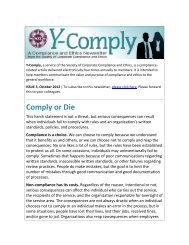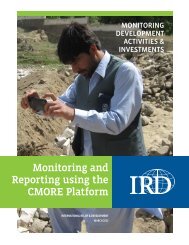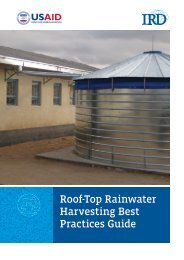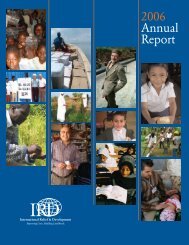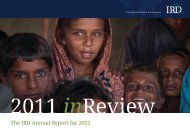Empowering citizens Engaging governments Rebuilding communities
Empowering citizens Engaging governments Rebuilding communities
Empowering citizens Engaging governments Rebuilding communities
Create successful ePaper yourself
Turn your PDF publications into a flip-book with our unique Google optimized e-Paper software.
the aggressive grants program yielded<br />
very strong long-term job numbers even<br />
as it addressed the pressing need of<br />
stabilizing business <strong>communities</strong><br />
significant challenges. The provision was a rather standard<br />
development assistance tenet regularly followed<br />
by NGOs. But in Iraq, the stipulation proved to be a<br />
barrier. IRD made a concerted effort to encourage<br />
apprentices and new vocational training graduates<br />
to apply for grants and start their own businesses,<br />
but few apprentices could match the grant’s required<br />
25–50 percent contribution. “That was probably the<br />
weakness, the cost-share element, because it kept a<br />
lot of people out of the small grants program,” said<br />
Gartner. “There was a tendency among applicants to<br />
falsify documents to meet that cost-share criteria.<br />
[But] it wasn’t the right time for cost-share buy-in.<br />
That’s a traditional development approach, that the<br />
community should own it, they should buy into it. In<br />
Iraq, I don’t think that was appropriate at that time. I<br />
mean, let’s just get their shops open first.”<br />
In adapting to a COIN environment, the business<br />
development component faced challenges. Many<br />
stemmed from the same issues some CIES projects<br />
faced, such as the inability to fully police those who<br />
were out to “cheat the system,” as Mamadou Sidibe,<br />
IRD’s director of monitoring and evaluation, put it.<br />
Sidibe joined IRD in March 2008, toward the end of<br />
CSP’s implementation. His mandate was to clear up<br />
reporting inconsistencies and strengthen internal<br />
oversight of the monitoring process, especially crucial<br />
for ensuring the integrity of business grants. “CSP<br />
would give you a grant on the basis of how many longterm<br />
jobs you would generate, but people could cheat<br />
on their grant proposal,” Sidibe said. “A businessman<br />
might say he would create five permanent jobs, but<br />
once he got the grant, instead of hiring five, he might<br />
hire two. Or instead of opening the business he<br />
proposed, he might do something else.”<br />
Jessica Cho, who worked on IRD’s post-CSP review,<br />
cited generators as a perfect example because they<br />
were such a commonly requested item for in-kind<br />
grants—and in such high demand due to Iraq’s weak<br />
energy infrastructure. “Someone might say he had<br />
a small store and needed a generator to operate a<br />
freezer or refrigerator, but you know, you can use a<br />
generator for a lot of things,” Cho said. “They were not<br />
always used for their intended purposes, but because<br />
of the security situation, it was extremely difficult to<br />
monitor every specific item.”<br />
Most of the problems that the business development<br />
component faced involved small and micro grants,<br />
often in the more dangerous and less secure locations,<br />
which were sometimes impossible for IRD’s<br />
monitoring agents to visit regularly. For the kind of conflict<br />
environment in which CSP was operating, Sidibe<br />
said, it was simply impossible to eliminate every<br />
corrupt influence. And overall, the aggressive grants<br />
program yielded very strong long-term job numbers<br />
even as it addressed the pressing need of stabilizing<br />
business <strong>communities</strong>.<br />
Quick impact with a long-term view<br />
While the program sought to enhance knowledge of<br />
private enterprise, teach good business practices, and<br />
stimulate community-led growth, it focused primarily on<br />
shop owners whose established businesses had been<br />
destroyed or shuttered. In some cases, the shops<br />
had been abandoned. In others, the threat of violence<br />
drove shopkeepers away. And often, such as for street<br />
market rehabilitations, IRD used the grants program<br />
alongside CSP’s infrastructure program as a means of<br />
generating a rapid response for quick results.<br />
In early 2007, a suicide bomber detonated a truck<br />
bomb in Baghdad’s Sadriya Market, a popular commercial<br />
district with more than 300 shops, cafes, and<br />
kiosks. More than 130 people were killed and more<br />
than 330 wounded. The day after the attack, two IRD<br />
grants officers headed to the market to evaluate the<br />
damage and talk to shop owners about applying for<br />
CSP grants to help rebuild their businesses. “I just<br />
3<br />
Successes and setbacks<br />
43


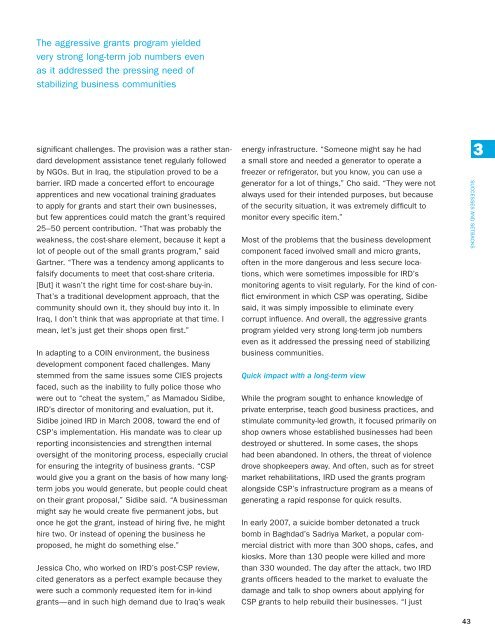
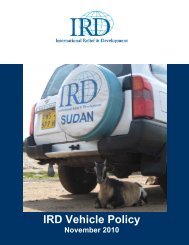
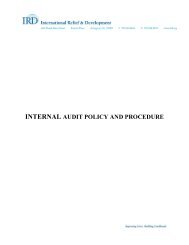
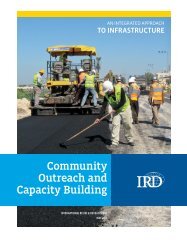
![Guide bonne pratique production d'oignon qualité_VF_4_2411012[1]](https://img.yumpu.com/23506639/1/184x260/guide-bonne-pratique-production-doignon-qualitac-vf-4-24110121.jpg?quality=85)

